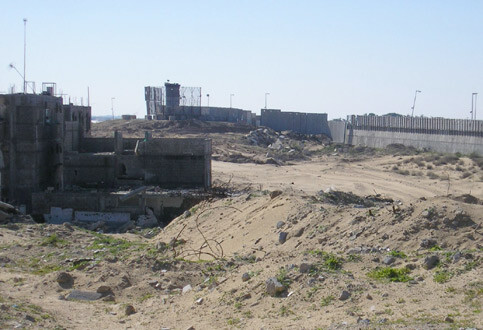Trócaire 21 August 2005

A huge, 50-foot-high concrete wall separates the Gush Katif settlement bloc from Khan Yunis. Palestinian land between the Israeli settlement and Khan Yunis has been destroyed. (Arjan El Fassed)
Last December I turned up at a border crossing leading from Israel to the infamous Gaza strip as part of a delegation of Catholic development agencies. I was looking forward to the visit, to seeing first-hand the situation in which thousands of Palestinians were living. But four hours later I walked away, together with half the group, refused entry by Israeli security because our papers for entry did not have the required approvals. While the Palestinians living within this small piece of land could not get out, I could not get in.
The other three members of the delegation did, however, and their subsequent reports of the poverty and deprivation suffered by the Palestinians were bleak and harrowing. The UN has established that 68% of the residents of the Gaza strip live on less then US$1 per day. These are poverty levels akin to the poorest African states. It was hard to believe driving through Israel to reach the frontier that people were living in such appalling circumstances beyond the barbed wire fence. They were effectively prisoners.
The United Nations recently published review of its 2005 humanitarian appeal for the occupied Palestine territory stated: “Living conditions have further been eroded by the substantial decline in the quality of health and education services, and the inability of Palestinians to access them.”
Palestinians are poor and becoming poorer because they can’t get jobs. They can’t get access to adequate health care, to education or to employment because of the internal controls imposed by Israel. They need permits from the Israeli authorities to gain access to land and crops, to medical facilities, to schools and universities, and even to visit family and friends.
The World Bank has acknowledged that poverty in the occupied Palestinian Territory (OPT) is due to the loss of employment and drop in economic activity resulting from the closure of the Israeli border and other internal borders. The construction of the 670km long wall encircling the occupied territories is the most visible aspect of those internal closures.
Over 3,000 journalists are expected to descend on the Gaza strip in the coming days to watch the dismantling of the 17 settlements that have been occupied by roughly 8,000 Israeli settlers since the war in 1967.
So when the Israeli army and settlers withdraw from Gaza, what will it really mean to those Palestinians trying to find work, go to school, or access health facilities? Gazans may feel relieved that there will be no more Israeli military checkpoints inside the strip, but little else will change – at least in the short-term - because the Israeli authorities will continue to have ultimate control over all the exit points from Gaza to Israel, the West Bank and abroad.
An example of how Israel controlled the internal borders last year shows that there is cause for serious concern. For a total of 156 days, the main crossing into Israel, Erez, was closed completely to all workers. Rafah, the exit point on the border with Egypt, was closed for a full 82 days in 2004. Worse still, all Palestinian males between the ages of 16 and 35 wanting to leave, even for hospital treatment abroad, were banned from crossing between 17 April 2004 and February 2005.
While removal of the 8,000 settlers in Gaza and four West Bank settlements is an important political event it is equally important that we look beyond this to the ongoing reality of the lives of the Palestinian people. Whatever opportunities this withdrawal offers must be acted upon to overcome the misery in which these people have been condemned to live. The international community must ensure that Gaza does not become, in effect, the largest open-air prison in the world.
It must also be recognised that Gaza is not the only critical issue here. The restrictions have been equally disruptive all over the West Bank, and could see the Gaza-isation of the Occupied Palestinian Territory.
The UN Office for the Coordination of Humanitarian Affairs (OCHA) has said that while 20 to 25 per cent of checkpoints had been removed in recent months, there had been an increase of 300 per cent in flying checkpoints during the same period. Flying checkpoints, normally a few sandbags and armed vehicles in the middle of the road - can occur at any time and at any place. They are extremely disruptive to daily life as people have no way to plan a simple journey to school, to work or to the market.
The UN predicts a gradual worsening of the situation in Gaza and the West Bank during 2006 because there has been no shift in the underlying causes that have led to the poverty crisis.
Trócaire’s work in the region supports grassroots organisations in both Palestine and Israel that are seeking a non-violent path to peace based on international humanitarian law. It is these laws that have constantly been flouted, ignored and undermined by the Israeli authorities both in Gaza and the West Bank.
The next time I visit Gaza, I hope I gain access.
Justin Kilcullen is director of Trócaire, the Overseas Development Agency of the Catholic Church in Ireland
Related Links